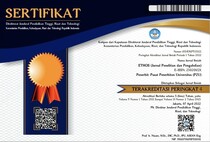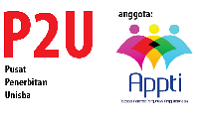Nilai Manfaat Ekonomi dalam Pengelolaan Sumber Daya Air Lintas Wilayah Berkelanjutan
Abstract
Abstract. Water resources can be a catalyst for cross-regional cooperation that is mutually beneficial for the economic development of each region. The service provider has the authority to decide on the sustainability of water resources management collaboration. The principle is that cooperation must have a positive impact on the development of water resources areas. It is necessary to calculate the extent to which the transferred water can contribute to the sharing of the cost of recovering the catchment area of the water source. The value of the economic benefits of water is one way to formulate the extent to which cooperation in managing cross-regional water resources can be developed. Through the analysis of the value of the economic benefits of water, the price of water can be predicted so that a component of the compensation costs for environmental services will have to be paid by the water user. The analysis shows that 75% of the economic benefits of water are contributed by domestic water use with compensation costs that must be paid by the beneficiary in the amount of Rp. 3,875,590,943. If converted into conservation activities, the use of compensation for environmental services will be able to rehabilitate 30% of critical forest land in the Paniis spring catchment area. Regarding the need for funds for conservation of the catchment area of the very large Paniis water source, the allocation of water for domestic needs is worth developing. Utilization of environmental service compensation funds from this commercial aspect needs to be fully promoted so that the Kuningan-Cirebon City Regency collaboration in the field of water resources can be sustained.
Keywords: value of economic benefits, domestic water, catchment area, water resources management, sustainable.
Abstrak. Sumber daya air merupakan katalis kerjasama lintas wilayah yang saling menguntungkan bagi pengembangan ekonomi wilayah masing-masing. Penyedia jasa memiliki kewenangan untuk memutuskan keberlanjutan kerjasama pengelolaan sumberdaya air tersebut. Prinsipnya adalah kerjasama harus memberikan dampak positif bagi pengembangan kawasan sumber air. Diperlukan perhitungan sejauhmana air yang ditrarsfer mampu memberikan kontribusi sharing biaya pemulihan kawasan catchment area sumber air. Nilai manfaat ekonomi air adalah salah satu cara untuk merumuskan sejauhmana kerjasama dalam pengelolaan sumber daya air lintas wilayah dapat dikembangkan. Melalui analisa nilai manfaat ekonomi air, harga air dapat diprediksi sehingga akan diperoleh besaran komponen biaya kompensasi jasa layanan lingkungan yang harus dibayarkan oleh pemanfaat air. Hasil analisa memperlihatkan 75% nilai manfaat ekonomi air disumbangkan oleh pemanfaatan air domestik dengan biaya kompensasi yang harus dibayarkan oleh pemanfaat sebesar Rp. 3.875.590.943. Jika dikonversikan ke dalam kegiatan konservasi, penggunaan dana kompensasi jasa lingkungan ini mampu merehabilitasi 30% lahan hutan kritis di kawasan catchment area mata air Paniis. Terkait kebutuhan dana konservasi kawasan catchment area sumber air Paniis yang sangat besar, maka alokasi air untuk kebutuhan domestik ini layak dikembangkan. Pemanfaatan dana kompensasi jasa lingkungan dari aspek komersial ini perlu digalakan sepenuhnya agar kerjasama Kabupaten Kuningan-Kota Cirebon di bidang sumberdaya air ini dapat berkelanjutan.
Kata Kunci: nilai manfaat ekonomi, air domestik, catchment area, pengelolaan sumber daya air, berkelanjutan.
Keywords
Full Text:
PDFReferences
Acreman, M. 2004. Water and Ecology. United Nations Educational, Scientific, and Cultural Organizations (UNESCO). Paris
Aylward B, Seely H, Hartwell R, Dengel J. 2010. The Economic Value of Water for Agricultural, Domestic and Industrial Uses: A Global Compilation of Economic Studies and Market Prices. Ecosystem Economics.
Brilly M, Globevnik L. 2003. Sustainable Water Resources Management in Dragonja Catchment, Slovenia. Water Resources Systems—Hydrotogical Risk, Management and Development (Proceedings of symposium HS02t held during IUGG2Û03 al Sapporo. IAHS Publ. no. 281. 2003.
Fachruddin K, 2004. Pendekatan Analisa Cost Benefit Sebagai Alat Pengambilan Keputusan Dalam Menentukan Konservasi Daerah Lahan Basah. Makalah Pribadi. Pengantar ke Falsafah Sains (PPS702). Sekolah Pasca Sarjana / S3 Institut Pertanian Bogor.
Isnin M, Basri H, Romano. 2012. Nilai Ekonomi Ketersediaan Hasil Air Dari Sub Daerah Aliran Sungai (DAS) Krueng Jreu Kabupaten Aceh Besar. Jurnal Manajemen Sumberdaya Lahan. Volume 1, Nomor 2, hal. 184-193.
Juwana I, Muttil N, Perera B.J.C.2012. Sustainable Water Resource Management: Definitions, criteria and guidelines.Science of the Total Environmental.
Owen, Stephanie Michaela. 2016. “Estimating the Economic Value of Water for Agriculture and Other Industries in Tennessee.” In .
Ramdan H, 2006, Pengelolaan Sumber Air Minum Lintas Wilayah Di Kawasan Gunung Ciremai Propinsi Jawa Barat, Sekolah Pascasarjana Institut Pertanian Bogor, Indonesia.
Raymond, 2007. Nilai Manfat Air Dan Tarifikasi Layanan Air di Daerah Aliran Sungai (DAS) Kali Brantas, Tesis, Program Magister Teknik Sipil
Sanim, B. 2011. Sumberdaya Air dan Kesejahteraan Publik, Suatu Tinjauan Teoritis dan Kajian Prkatis. IPB Press. Bogor.
Seidakhmetov M, Alzhanova A, Baineeva P, Abdramankyzy A, Bekmanova G, Tymbaeva Z. 2014. Mechanism of Trans boundary Water Resources Management for Central Asia Countries. Procedia - Social and Behavioral Sciences 143. p. 604 – 609.
Sugandhy A. 1997. Kebijaksanaan dan Strategi Pengelolaan Sumberdaya Air, Deputi Bidang Prasarana BAPPENAS, Jakarta.
Xi Xia, Kim Leng Poha, 2013. Using System Dynamics for Sustainable Water Resources Management in Singapore, National University of Singapore.
Yustiana Y , Hermawan E, Ramdan H, 2015. Penentuan Model Tarif Sumber Daya Air Sebagai Kompensasi Jasa Ekosistem Kawasan Hutan. Prosiding Seminar Nasional Masyarakat Biodiversity Indonesia, Vol 1, No.7. Hal 1735-1740.
DOI: https://doi.org/10.29313/ethos.v9i1.6260
Refbacks
- There are currently no refbacks.
Alamat Redaksi:
LPPM Unisba, Lantai 2, Jl. Purnawarman 63, Bandung 40116, Jawa Barat, (022) 4203368 , (022) 4264064. ethos.unisba@gmail.com / ethos@unisba.ac.id

This work is licensed under a Creative Commons Attribution-NonCommercial-ShareAlike 4.0 International License.














